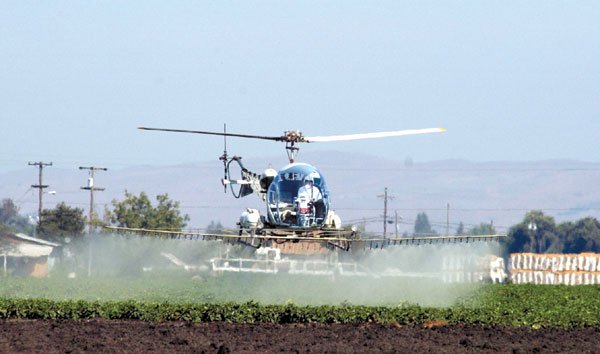Gilroy
– People who spend their weekends gardening might have more in
common with farmers than they thought, and the shared bond comes in
the form of pesky little bugs – and the measures taken to wave them
good-bye.
Gilroy – People who spend their weekends gardening might have more in common with farmers than they thought, and the shared bond comes in the form of pesky little bugs – and the measures taken to wave them good-bye.
While pesticides sometimes get a bad wrap for their impacts on health and the environment, they’re a necessary tool to help produce healthy crops, said Santa Clara County’s Agricultural Commissioner Greg Van Wassenhove.
“We only use pesticides when we absolutely need to,” he said. “And they’re a valuable tool for farmers.”
Agricultural pesticide use in California is tightly regulated by a comprehensive, statewide system of laws out of the state’s Department of Pesticide Regulation. Each county’s agricultural commissioner enforces those laws locally and updates them regularly to reflect any changes and new developments in pesticide technology.
A system of checks and balances among the state, the county and farmers helps ensure pesticides are being used efficiently and safely. Field inspectors hold regular spot checks to check farmers’ pesticide application, storage, signage and disposal. Failure to comply can result in penalties ranging from written notice of violation to fines to legal action, and the county reports all findings to the state.
Farmers can apply pesticides to their own crops or hire a pest control operator to handle the job for them. Operators earn application licenses through the county after taking several classes on pesticide safety and passing an exam issued by the agricultural commissioner’s office. Once a license is in their hands, operators undergo annual testing and must fulfill between 40 and 80 hours of educational requirements in order to retain their licenses.
Farmers who apply pesticides to their own crops also must satisfy similar educational requirements in order to gain application licenses, and they are required to supply their employees with all necessary information as well as supervise pesticide sprays.
Both commercial and private applicators wear safety gear such as coveralls, goggles and chemical resistant gloves while on the application site. Each time they apply pesticides, growers must report to the commissioner what chemicals were used and on which crops.
California farmers use a system called Integrated Pest Management, or IPM, to help manage harmful insects. IPM incorporates a combination of mechanical, biological and chemical controls that help farmers evaluate what pesticides are best suited for what crops and insects. Each pesticide goes through a federal review and two subsequent state reviews, which analyze the chemical’s state and environmental impacts. California is the only state to perform two state reviews.
One facet of IPM involves beneficial insects such as lacewings, robber flies and ladybugs that prey on crop-damaging insects. Bats, owls and other nocturnal flyers also help California farmers by combating harmful winged insects such as moths.
Beneficial insects work especially well when trying to target a specific harmful insect because each insect has a specific enemy, said Deputy Agricultural Commissioner Kevin O’Day. If blanket pesticides don’t eliminate the problem insect, a more pinpointed approach probably will do the trick. But care must be taken to ensure bringing the enemy insect to a new area won’t introduce a new problem to that area’s biological makeup, O’Day said.
Jeannie Lopez, office manager of Uesugi Farms, said most of her pesticide application is done through fertigation, or applying pesticides through the ground as opposed to a spray. Lopez attested to the county’s strict regulation of pesticide, and she said such restrictions are becoming more necessary with residential development so close to farms.
Another farmer, Dave Vanni of Solis Winery, said public perception of pesticides is sometimes skewed.
“It’s a double-edged sword. People tend to think pesticides can be harmful, but they help reduce blemishes on produce that people might not want to see in the grocery store,” he said. “They’re probably more beneficial than most people realize.”














